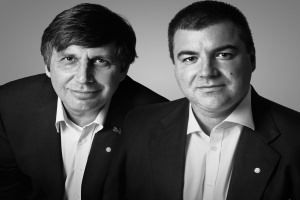Royal Society accolades for Manchester scientists
22 Jul 2013
University of Manchester Nobel Laureates Andre Geim and Kostya Novoselov have been awarded two of the Royal Society’s most significant honours.

Sir Andre is the recipient of the Copley Medal, believed to be the world’s oldest scientific prize. He receives the medal for numerous scientific contributions and, in particular, his work on graphene and other 2D materials.
The Copley medal was first awarded by the Royal Society in 1731, 170 years before the first Nobel Prize.
It is awarded for outstanding achievements in scientific research and has been awarded to such eminent scientists as Charles Darwin, Michael Faraday, Albert Einstein and James Watson.
Professor Novoselov receives the Royal Society’s Leverhulme Medal, for revolutionary work on graphene, other two‐dimensional crystals and their heterostructures that has great potential for a number of applications, from electronics to energy. Both professors are Fellows of the Royal Society.
Geim and Novoselov were awarded the Nobel prize in 2010 for groundbreaking experiments with graphene – the two-dimensional, one-atom thick material they first isolated in 2004.
Graphene is the world’s thinnest, strongest and most conductive material. It has the potential to revolutionise a huge number of diverse applications; from smartphones and ultrafast broadband to drug delivery and computer chips.
Sir Andre said: “I am absolutely delighted to receive this old and prestigious award. Not only I am humbled, I also feel younger.
“I especially appreciate that the medal recognizes my post-Nobel work on atomically-thin materials and their smart assemblies, the new research field richer and even more exciting than graphene itself.”
Sir Kostya added: “It has always been part of the excitement of the work on graphene – most fundamental experiments in the physics of this material often lead to the creation of new devices and applications. The developments of the recent few years show that such transition goes even smoother and faster than one could have envisaged.”
As well as the Copley and Leverhulme Medals, the Royal Society has announced all of the recipients of its awards, medals and prize lecture. The scientists receive the awards in recognition of their achievements in a wide variety of fields of research.
Sir Paul Nurse, President of the Royal Society, said: “I’m delighted that the Copley Medal has been awarded to Andre Geim this year. His work on graphene could truly revolutionise many technologies.
“Chancellor George Osborne highlighted graphene as one of the many exciting areas of science the UK should exploit during his speech on science as a UK economic driver given at the Royal Society. He has since backed that up with funding and I’m in no doubt that we’ll see exciting developments from Geim, his collaborator Novoselov and graphene in the next few years.”
